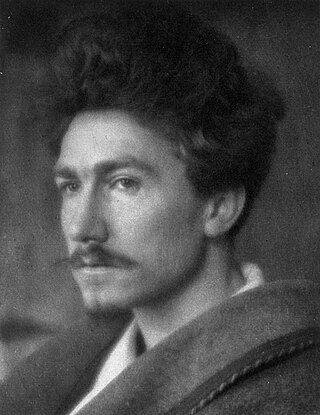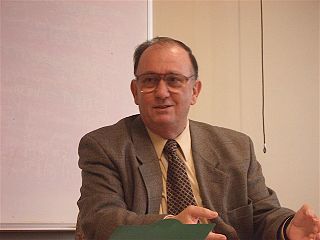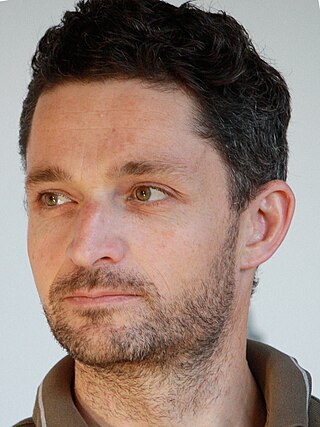Related Research Articles

Giovanni Boccaccio was an Italian writer, poet, correspondent of Petrarch, and an important Renaissance humanist. Born in the town of Certaldo, he became so well known as a writer that he was sometimes simply known as "the Certaldese" and one of the most important figures in the European literary panorama of the fourteenth century. Some scholars define him as the greatest European prose writer of his time, a versatile writer who amalgamated different literary trends and genres, making them converge in original works, thanks to a creative activity exercised under the banner of experimentalism.

Ezra Weston Loomis Pound was an expatriate American poet and critic, a major figure in the early modernist poetry movement, and a collaborator in Fascist Italy and the Salò Republic during World War II. His works include Ripostes (1912), Hugh Selwyn Mauberley (1920), and his 800-page epic poem, The Cantos.

Publius Papinius Statius was a Latin poet of the 1st century CE. His surviving poetry includes an epic in twelve books, the Thebaid; a collection of occasional poetry, the Silvae; and an unfinished epic, the Achilleid. He is also known for his appearance as a guide in the Purgatory section of Dante's epic poem, the Divine Comedy.

The Metamorphoses is a Latin narrative poem from 8 CE by the Roman poet Ovid. It is considered his magnum opus. The poem chronicles the history of the world from its creation to the deification of Julius Caesar in a mythico-historical framework comprising over 250 myths, 15 books, and 11,995 lines.
Claudius Claudianus, known in English as Claudian, was a Latin poet associated with the court of the Roman emperor Honorius at Mediolanum (Milan), and particularly with the general Stilicho. His work, written almost entirely in hexameters or elegiac couplets, falls into three main categories: poems for Honorius, poems for Stilicho, and mythological epic.

Demogorgon is a deity or demon associated with the underworld. Although often ascribed to Greek mythology, the name probably arises from an unknown copyist's misreading of a commentary by a fourth-century scholar, Lactantius Placidus. The concept itself can be traced back to the original misread term demiurge.

Guido Cavalcanti was an Italian poet. He was also a friend and intellectual influence on Dante Alighieri.

The Achilleid is an unfinished epic poem by Publius Papinius Statius that was intended to present the life of Achilles from his youth to his death at Troy. Only about one and a half books were completed before the poet's death. What remains is an account of the hero's early life with the centaur Chiron, and an episode in which his mother, Thetis, disguised him as a girl on the island of Scyros, before he joined the Greek expedition against Troy.

Cino da Pistoia was an Italian jurist and poet. He was the university teacher of Bartolus de Saxoferrato and a friend and intellectual influence on Dante Alighieri.

Genealogia deorum gentilium, known in English as On the Genealogy of the Gods of the Gentiles, is a mythography or encyclopedic compilation of the tangled family relationships of the classical pantheons of Ancient Greece and Rome, written in Latin prose from 1360 onwards by the Italian author and poet Giovanni Boccaccio.

Le Roman de Troie by Benoît de Sainte-Maure, probably written between 1155 and 1160, is a 30,000-line epic poem, a medieval retelling of the theme of the Trojan War. It inspired a body of literature in the genre called the roman antique, loosely assembled by the poet Jean Bodel as the Matter of Rome. The Trojan subject itself, for which de Sainte-Maure provided an impetus, is referred to as the Matter of Troy.

De casibus virorum illustrium is a work of 56 biographies in Latin prose composed by the Florentine poet Giovanni Boccaccio of Certaldo in the form of moral stories of the falls of famous people, similar to his work of 106 biographies De Mulieribus Claris.
The Eneados is a translation into Middle Scots of Virgil's Latin Aeneid, completed by the poet and clergyman Gavin Douglas in 1513.

The Decameron, subtitled Prince Galehaut and sometimes nicknamed l'Umana commedia, is a collection of short stories by the 14th-century Italian author Giovanni Boccaccio (1313–1375). The book is structured as a frame story containing 100 tales told by a group of seven young women and three young men; they shelter in a secluded villa just outside Florence in order to escape the Black Death, which was afflicting the city. Boccaccio probably conceived of the Decameron after the epidemic of 1348, and completed it by 1353. The various tales of love in The Decameron range from the erotic to the tragic. Tales of wit, practical jokes, and life lessons contribute to the mosaic. In addition to its literary value and widespread influence, it provides a document of life at the time. Written in the vernacular of the Florentine language, it is considered a masterpiece of early Italian prose.

Contact between Geoffrey Chaucer and the Italian humanists Petrarch or Boccaccio has been proposed by scholars for centuries. More recent scholarship tends to discount these earlier speculations because of lack of evidence. As Leonard Koff remarks, the story of their meeting is "a 'tydying' worthy of Chaucer himself".

Michael Edward Stone is a professor emeritus of Armenian Studies and of Comparative Religion at the Hebrew University of Jerusalem. His research deals with Armenian studies and with Jewish literature and thought of the Second Temple period. He is also a published poet.
William Brooke Smith was an American painter and friend of Ezra Pound. His death from tuberculosis greatly affected Pound, who dedicated his first poetry collection, A Lume Spento, to Smith.

Simon West is an Australian poet. He is the author of five books of poetry, including Prickly Moses in the Princeton Series of Contemporary Poets, and a translation of the Italian poet Guido Cavalcanti. He lives in Melbourne, where he works as a translator and Italianist.

Robert B. Hollander Jr. was an American academic and translator, most widely known for his work on Dante Alighieri and Giovanni Boccaccio. He was described by a department chair at Princeton University as "a pioneer in the creation of digital resources for the study of literature" for his work on the electronic Princeton and Dartmouth Dante projects. In 2008, he and his wife, Jean Hollander, co-received a Gold Florin award from the City of Florence for their English translation of Dante's Divine Comedy.
Orazio Filippo Bianchi was an Italian lawyer and classical scholar.
References
- ↑ Harald Anderson, "Publius Papinius Statius," in Catalogus Translationum et Commentariorum: Mediaeval and Renaissance Latin Translations and Commentaries Vol. XIII (Toronto,2020) pages 103-105, 194,196,199
- ↑ Daily Pennsylvanian (October 1, 1984)
- ↑ Richard Sieburth, "Channeling Guido: Ezra Pound's Cavalcanti Translations," in Guido Cavalcanti Tra I Suoi Lettori (Florence, Edizioni Cadmo, 2003), ed. Maria Luisa Ardizzone, p. 266 n. 6
- ↑ "Rome Prizes Awarded". The New York Times. 18 March 1988. Retrieved 21 July 2016.
- ↑ "FRIENDS, AMERICANS, COUNTRYMEN". The Washington Post . 18 March 1988. Retrieved 21 July 2016.
- ↑ "Major Honor," Daily Pennsylvanian 38 (March 24, 1988)